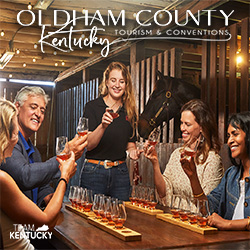Boasting settlers from Germany, Sweden, Norway and even the Eastern and Western portions of the United States, America’s Heartland is an international crossroads for culture.
The Midwest is where archaeologists go to sort through varied finds from early Native American and European settlers. It’s been called the nation’s breadbasket because of the rich farming history of the region, but you could also call it a melting pot.
From a French settlement that keeps its history alive through lively festivals to a small Indiana town that made its mark on the map for having the first “escape-proof” jail, here are some of the most storied towns of the Midwest.
Galena, Illinois
Galena is best known as one of the country’s first “Boom Towns.” Named for its abundance of a very dense and very valuable mineral of the same name that was first mined by the Native Americans that inhabited the region, Galena was the site of the first major mineral rush in the nation. Overnight the town sprung to life as 15,000 people began calling Galena home.
“The architecture and footprint for our historic downtown still remains,” said Jay Allen, director of sales for Galena Country Tourism, “especially with the buildings on and near Main Street, like the DeSoto House Hotel, which is the oldest operating hotel in Illinois.”
The hotel opened in 1855 and is one of the favorite places to stay in town. Most of the main attractions revolve around one of Galena’s most famous residents, Ulysses S. Grant, who came to the town with his family in 1860 and worked in his father’s leather goods store before heading off to fight in the Civil War. Visitors can tour the original Grant Home or explore the Galena and U.S. Grant Museum for an inside look at Galena’s unique historical context.
A hop aboard the town’s narrated trolley rides will give groups a glimpse at the town’s best features, like its 125 shops and dining establishments, along with some great local wineries and a distillery.
Elkader, Iowa
In Elkader, Iowa, legacy is more than a word; it’s the foundation for the town’s existence. In 1846, when early settlers read about the heroics of a young man making a difference in the lives of thousands on the other side of the world, they decided to name the town in his honor to secure his legacy.
Abd el-Kader was a young Algerian Sufi scholar who unexpectedly found himself leading his entire country in successfully resisting French colonialism between 1830 and 1847, saving a Christian minority in Syria from tribal violence. Elkader remains the only town in America named for an Islamic hero. The community has an Algerian restaurant, Schera’s, well known for its beer launch parties, and the town is home to one of three whitewater parks in Iowa as well as a restored 1903 opera house, the Historic Motor Mill Site and Pedretti’s bakery, a local favorite since 1968.
“I think the most interesting thing about Elkader historically is its connection with the country of Algeria,” said Benjamin Friedrich, marketing director for Art in the Park Elkader, a fine-art festival held on the third weekend in August. “The city is sister cities with a city called Mascara in Algeria. Their relationship is very sweet, and Elkader has hosted a ton of high-level Algerian officials. When Elkader suffered the effects of a major flood in 2008, Algerians played a big role in helping them recover and rebuild.”
Ste. Genevieve, Missouri
Walking the streets of Ste. Genevieve is like taking a stroll through time. The village was founded in the early 1700s, making it Missouri’s oldest town. Over the years, residents have held on to the stories and buildings that shaped Ste. Genevieve, preserving the town’s charm, ambiance and historic buildings.
The town is full of original vertical log structures, narrow streets and fenced gardens that surround historic 18th-century architecture. Many have likened the town to the French wine country because it was settled by French Canadians who farmed the rich alluvial soil and prepared it for the grapes that grow along the Route du Vin today.
“Ste. Genevieve was named after the patron saint of Paris, France,” said Sandra Cabot, director of Ste. Genevieve Tourism. “The French name Genevieve is a proper female noun, which is why we still use an ‘e’ on Ste. Genevieve to keep it in its feminine form.”
The town is famous for its historic sites, local art and wineries. The tourism board is happy to help arrange custom tours for groups to make the most of a visit to this provincial destination.
Crown Point, Indiana
Before there was Las Vegas, there was Crown Point, Indiana. No, this little Indiana city wasn’t a gambling mecca or a buffet haven; from the early 1900s until 1938, Crown Point was best known as the place to get married — and to get married quickly. Incorporated in 1868, the town soon adopted a no-waiting, 24-hour wedding operation at the Crown Point Courthouse, where couples of consenting age and proper sobriety could be wed on the spot.
“Rudolph Valentino, Mohammed Ali, Red Skelton and other famous faces have wed in the historic courthouse in Crown Point’s downtown,” said Erika Dahl, director of communications for the South Shore Convention and Visitors Authority in Indiana. “A block south of the courthouse is the old sheriff’s house and jail where gangster John Dillinger was held after his capture in Arizona.”
The jail is the other defining feature of this petite Indiana city, where Dillinger famously escaped from what was known as the “escape-proof” building. Dillinger allegedly carved a gun out of wood, took a hostage and escaped the jail only to be caught outside a theater in Chicago a few months later.
Stillwater, Minnesota
Stillwater has a rich history: The town was one of the wealthiest settlements in the Midwest because of the log boom in the late 1800s.
“Stillwater was one of the largest lumber-producing towns in the world,” said Christie Rosckes, marketing director for Discover Stillwater and the Stillwater Convention and Visitor Bureau. “It’s because of the successful lumber barons and lumberjacks that we have so many beautiful historic mansions and a large downtown district.”
The town was established in 1848, making it the first city in the state and earning it the title “Birthplace of Minnesota.” In 1888 Stillwater went on to seal its fame as one of the first towns west of Chicago to have electric lights. It soon became home to the first electric streetcar railway in Minnesota.
Visiting groups today can hop aboard a paddle-wheel riverboat cruise on the St. Croix River to enjoy a lunch, dinner or Sunday-brunch cruise with a live jazz band. Offshore options include touring the restored lumber-baron mansions or taking in the sights on a 45-minute narrated trolley tour. The town’s numerous boutiques, restaurants, breweries and galleries make it a great spot for soaking in the historic roots of Minnesota, and the do-it-yourself workshops at Sawdust Savvy and Kari’s Create and Paint Studio give a more immersive look at the town’s productive roots.










